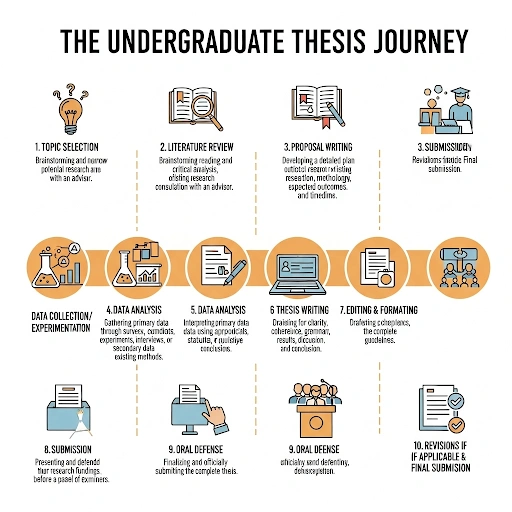- What is a College Thesis, and Why a College Thesis Checklist is Essential?
- Why Learning Thesis Structure and Process Matters for Undergraduates
- How It Works: The College Thesis Writing Checklist for Undergraduates
- Navigating Thesis Deadlines and Revisions
- Different Thesis Structures & Formats
- Common Mistakes Undergraduates Make in Thesis Writing (and How to Avoid Them)
- Expert Tips and Best Practices for Undergraduate Thesis Writing
- FAQ Section
What is a College Thesis, and Why a College Thesis Checklist is Essential?
An undergraduate thesis, sometimes referred to as a capstone project or senior essay, is usually a long-form academic paper (often 40–100+ pages) required for graduation in many disciplines. Using a college thesis checklist can help students manage this complex task step by step. The process involves independent research, critical analysis, and presenting a well-supported argument or an original contribution to knowledge. By following a practical college thesis checklist, undergraduates can keep track of all the essential components and deadlines. Working closely with a faculty advisor, students can apply the college thesis checklist to organize their research, structure their chapters, and ensure their work meets academic standards.
Why a Thesis Writing Checklist is Crucial for Undergraduates in 2025:
- Breaks Down a Daunting Task: A thesis is a monumental undertaking. A checklist divides it into manageable, actionable steps, making the entire process less overwhelming and more achievable.
- Ensures Comprehensive Coverage: With so many components (research, writing, editing, formatting), it’s easy to overlook crucial steps. A checklist ensures you address all necessary elements, from initial proposal to final submission.
- Manages Time and Deadlines: A well-structured checklist helps you allocate time effectively, track progress, and meet various internal and external deadlines (e.g., proposal submission, draft deadlines, final submission).
- Reduces Stress and Anxiety: Knowing exactly what you need to do next, and seeing your progress checked off, can significantly reduce the anxiety associated with such a large academic project.
- Maintains Quality and Consistency: By ensuring all parts of the thesis adhere to academic standards and university guidelines, a checklist helps maintain the overall quality and consistency of your work.
- Facilitates Collaboration with Advisors: A checklist provides a clear framework for discussions with your faculty advisor, allowing both of you to track progress and identify areas needing attention efficiently.

Why Learning Thesis Structure and Process Matters for Undergraduates
Beyond simply checking off tasks, truly understanding the comprehensive college thesis writing checklist for undergraduates and the underlying reasons for each step is crucial for profound academic growth and future success:
- Develops Advanced Research Skills: The thesis process forces you to delve deep into academic literature, identify gaps in knowledge, formulate research questions, and synthesize complex information – skills invaluable for graduate school or research-intensive careers.
- Hones Critical Thinking & Argumentation: You’ll learn to critically evaluate sources, construct nuanced arguments, and defend your positions with evidence, moving beyond simply summarizing information to truly engaging with it.
- Improves Academic Writing Prowess: Writing a thesis demands precision, clarity, coherence, and adherence to specific academic conventions (citation styles, formal tone). This elevates your writing to a professional level.
- Fosters Independent Learning & Discipline: A thesis is largely a self-directed project. It teaches you how to manage a long-term goal, stay motivated, and work autonomously – essential qualities for any complex future undertaking.
- Builds a Portfolio Piece: Your thesis is a tangible demonstration of your academic capabilities and research interests. It can be a powerful asset when applying for graduate programs, scholarships, or jobs.
- Contributes to Your Field: Even at the undergraduate level, a well-executed thesis can offer original insights or new perspectives, allowing you to contribute meaningfully to your chosen discipline. This structured approach mirrors methodologies like those found in Agile Scrum Certification Tips for Beginners, which emphasize iterative development and clear deliverables.
How It Works: The College Thesis Writing Checklist for Undergraduates
Successfully completing your undergraduate thesis involves a series of interconnected stages. This detailed college thesis writing checklist for undergraduates outlines the key thesis structure and process steps to guide you:
Phase 1: Pre-Writing & Research (Laying the Foundation)
This initial phase is critical for defining your project and gathering necessary resources.
- ☐ Topic Selection & Refinement:
- Identify broad areas of interest within your major.
- Brainstorm specific research questions that are both interesting and feasible.
- Ensure the topic is narrow enough to be thoroughly researched within the timeframe.
- ☐ Faculty Advisor Selection:
- Research faculty whose expertise aligns with your topic.
- Meet with potential advisors to discuss your ideas and their availability.
- Confirm the advising relationship and clarify expectations.
- ☐ Proposal Development & Submission:
- Outline your research question(s), objectives, methodology, and preliminary literature review.
- Adhere to university/departmental guidelines for proposal format and length.
- Submit your proposal by the deadline and obtain approval.
- ☐ Comprehensive Literature Review:
- Identify key scholarly articles, books, and other relevant sources.
- Critically evaluate sources for relevance, credibility, and contribution to your topic.
- Organize your findings (e.g., using citation management software like Zotero or Mendeley).
- Identify gaps in existing literature that your thesis will address.
- ☐ Methodology Design (if applicable):
- Determine your research approach (e.g., quantitative, qualitative, mixed-methods).
- Detail data collection methods (surveys, interviews, experiments, archival research).
- Outline data analysis techniques.
- ☐ Establish a Timeline:
- Break down the entire thesis process into smaller tasks.
- Assign realistic deadlines for each task (e.g., chapter drafts, advisor meetings).
- Build in buffer time for unexpected delays.

Phase 2: Writing the Thesis (Crafting Your Argument)
This is the core writing phase, where your research transforms into coherent chapters.
- ☐ Introduction:
- Hook the reader and provide background context.
- Clearly state your research question(s) and thesis statement.
- Outline the structure of your thesis.
- ☐ Literature Review Chapter:
- Synthesize and critically evaluate existing scholarship relevant to your topic.
- Demonstrate how your research fits into and contributes to the broader academic conversation.
- Identify theoretical frameworks or concepts that will guide your analysis.
- ☐ Methodology Chapter:
- Detail the research design, data collection methods, and analytical approaches.
- Justify your methodological choices and address any ethical considerations.
- ☐ Results/Findings Chapter(s):
- Present your data and findings clearly and objectively.
- Use tables, graphs, and figures where appropriate to illustrate your results.
- Avoid interpretation in this section; simply present what you found.
- ☐ Discussion Chapter:
- Interpret your findings in relation to your research question(s) and existing literature.
- Discuss the implications of your results.
- Address any limitations of your study.
- Suggest avenues for future research.
- ☐ Conclusion:
- Summarize your main findings and restate your thesis statement (in new words).
- Reiterate the significance of your research.
- Offer final thoughts or a call to action if appropriate.
- ☐ Citations & Bibliography/References:
- Consistently use the required citation style (e.g., APA, MLA, Chicago).
- Ensure all in-text citations correspond to entries in your bibliography.
- Proofread your bibliography for accuracy and formatting.
Phase 3: Revision & Submission (Polishing for Perfection)
The final stage involves rigorous editing, formatting, and preparing for defense/submission.
- ☐ Self-Editing for Content & Clarity:
- Read your entire thesis for logical flow, coherent arguments, and clarity of expression.
- Check for strong topic sentences, smooth transitions, and well-supported claims.
- ☐ Advisor Feedback & Revisions:
- Submit drafts to your advisor according to your agreed-upon timeline.
- Carefully review and incorporate their feedback.
- Be prepared for multiple rounds of revisions.
- ☐ Proofreading (Grammar, Spelling, Punctuation):
- Read aloud to catch awkward phrasing and errors.
- Use grammar checkers (but don’t rely solely on them).
- Have fresh eyes (friends, writing center) proofread your work.
- ☐ Formatting & Compliance:
- Adhere strictly to university/departmental formatting guidelines (margins, font, spacing, page numbering, table of contents, list of figures/tables).
- Ensure proper placement of title page, abstract, acknowledgments, etc.
- ☐ Prepare for Defense/Presentation (if required):
- Create slides summarizing your research, methods, findings, and conclusions.
- Practice your presentation, anticipating questions.
- ☐ Final Submission:
- Submit your final, polished thesis by the official deadline.
- Confirm all required documents and forms are included.

Navigating Thesis Deadlines and Revisions
An undergraduate thesis, sometimes referred to as a capstone project or senior essay, is usually a long-form academic paper (often 40–100+ pages) required for graduation in many disciplines. Using a college thesis checklist can help students manage this complex task step by step. The process involves independent research, critical analysis, and presenting a well-supported argument or an original contribution to knowledge. By following a practical college thesis checklist, undergraduates can keep track of all the essential components and deadlines. Working closely with a faculty advisor, students can apply the college thesis checklist to organize their research, structure their chapters, and ensure their work meets academic standards.
Initial Planning & Unexpected Hurdles:
Leveraging the Checklist for Recovery:
Instead of panicking, Sarah turned to her checklist. She saw that she had built in some buffer time, a critical item on her “Expert Tips” section. She used this buffer to extend her literature review and revision phase by an extra week. She explicitly updated her checklist to reflect the new tasks:
- ☐ Search for scholarship on [specific theoretical framework].
- ☐ Integrate new research into Literature Review.
- ☐ Revise Lit Review for conceptual depth.
- ☐ Reschedule next advisor meeting.
For her writing process, she utilized the “writing in blocks” method from her checklist, dedicating specific hours each day to writing and avoiding distractions. When she got stuck on a paragraph, she’d move to another section, ensuring continuous progress.
Final Push & Submission:
Different Thesis Structures & Formats
While the core components of a thesis are generally consistent, specific disciplines or university departments may favor slightly different structures. Understanding these variations helps you to learn thesis structure comprehensively:
| Structure Type | Commonly Used In | Key Characteristics | Pros & Cons |
|---|---|---|---|
| Traditional (IMRAD) | Sciences, Engineering, Psychology, Quantitative Social Sciences | Introduction, Methods, Results, and Discussion. Often followed by Conclusion, References, Appendices. Clear, concise, focuses on empirical data. |
|
| Humanities/Essay-Style | Humanities (History, Literature, Philosophy), Qualitative Social Sciences | Introduction, main body chapters (each developing an argument or analyzing evidence), Conclusion. Less rigid, more discursive. |
|
| Article-Based (or “By Publication”) | Some STEM fields, especially at the graduate level, occasionally for advanced undergraduates. | Consists of 2-3 research papers (often published or submitted for publication), with an overarching introduction and conclusion. |
|
| Project-Based (or “Portfolio”) | Creative Arts, Design, Computer Science (software projects), Engineering (design projects) | Often includes a significant practical component (e.g., software, art piece, engineering design) accompanied by a written report explaining methodology, process, and reflection. |
|
Common Mistakes Undergraduates Make in Thesis Writing (and How to Avoid Them)
Even with a solid college thesis writing checklist for undergraduates, common pitfalls can derail your progress. Being aware of these will help you stay on track and ensure a smoother writing process:
- Procrastination: The biggest enemy of thesis writing. Breaking the project into small, manageable steps (as in the checklist) and setting mini-deadlines is key.
- Choosing Too Broad a Topic: An overly ambitious topic can lead to endless research and a lack of focus. Narrow it down to a specific, researchable question that can be answered within your timeframe.
- Lack of a Clear Thesis Statement: Without a strong, arguable thesis statement, your paper will lack direction and coherence. It’s the central argument you’ll be defending throughout your work.
- Insufficient Research: Not gathering enough credible sources, or not engaging critically with them, will weaken your arguments and analysis.
- Poor Time Management: Underestimating the time required for each phase (especially revisions!) can lead to rushed, subpar work. Use your timeline and stick to it.
- Ignoring Advisor Feedback: Your advisor is your most valuable resource. Actively engage with their comments and incorporate their suggestions to improve your work.
- Plagiarism: Intentional or unintentional, plagiarism has severe academic consequences. Always cite your sources meticulously using the required style.
- Neglecting Proofreading & Formatting: Minor errors in grammar, spelling, or formatting can detract from the professionalism of your thesis and even lead to deductions.
- Working in Isolation: While it’s independent research, don’t shy away from seeking help from your advisor, writing center, librarians, or peers.
Expert Tips and Best Practices for Undergraduate Thesis Writing
To truly excel in your undergraduate thesis and effectively learn thesis structure, incorporate these expert insights and best practices into your workflow:
- Start Early, Stay Consistent: The earlier you begin, the less stress you’ll experience. Consistent, even small, progress each week is far more effective than last-minute cramming.
- Treat Your Thesis Like a Job: Dedicate specific blocks of time each day or week to thesis work, just as you would for a job. Treat these appointments as non-negotiable.
- Outline, Outline, Outline: Before writing a single sentence, create a detailed outline for each chapter. This ensures logical flow and prevents getting lost in the weeds.
- Write Ugly First Drafts: Don’t aim for perfection in your first draft. Get your ideas down, even if they’re messy. You can always revise and refine later.
- Use a Citation Management Tool: Software like Zotero, Mendeley, or EndNote will save you countless hours organizing sources and generating bibliographies, preventing citation errors.
- Maintain a Research Log/Journal: Keep track of your research process, ideas, challenges, and insights. This can be invaluable when writing your methodology or discussion sections.
- Schedule Regular Advisor Meetings: Proactively schedule consistent meetings with your advisor. Come prepared with questions and specific sections for them to review.
- Take Breaks & Practice Self-Care: Thesis writing is a marathon. Schedule regular breaks, get enough sleep, eat well, and engage in activities that help you de-stress. Burnout is a real threat.
- Read Your Work Aloud: This simple technique helps you catch awkward phrasing, grammatical errors, and logical inconsistencies that your eyes might miss.
- Utilize Campus Resources: Your university’s writing center, library research support, and peer tutoring services are invaluable. Don’t be too proud to seek help!

FAQ Section
Here are some frequently asked questions about the college thesis writing checklist for undergraduates and how to learn thesis structure effectively:
Q: How do I choose a good thesis topic?
A: Choose a topic that genuinely interests you, as you’ll be spending a lot of time on it. Ensure it’s researchable (sufficient academic sources available), feasible (can be completed within the timeframe and resources), and manageable (not too broad or too narrow). Discuss ideas with your faculty advisor.
Q: What’s the typical length of an undergraduate thesis?
A: Length varies significantly by discipline and university. Humanities theses might range from 40-80 pages, while science theses could be shorter (20-40 pages, excluding appendices) if focused on empirical results. Always check your department’s specific guidelines.
Q: How often should I meet with my thesis advisor?
A: This should be agreed upon with your advisor, but generally, regular meetings (e.g., bi-weekly or monthly) are beneficial, especially during the research and drafting phases. Come prepared with questions and specific sections for them to review.
Q: What’s the difference between a literature review and a bibliography?
A: A **literature review** is a critical analysis and synthesis of existing scholarly work relevant to your research topic. It’s a narrative chapter where you discuss and evaluate sources. A **bibliography** (or References/Works Cited list) is simply an alphabetical list of all the sources you cited in your thesis, formatted according to a specific citation style.
Q: Can I use AI tools to help with my thesis?
A: AI tools can assist with tasks like brainstorming, summarizing articles, or generating initial outlines. However, they should **never** be used to generate full sections of your thesis or to replace your own critical thinking and original writing. Always check your university’s policies on AI use and cite any AI tools used according to your citation style.
Q: What if I hit a major roadblock or feel completely stuck?
A: This is normal! Don’t suffer in silence. Immediately reach out to your thesis advisor. They have likely seen many students face similar challenges and can provide guidance, help you re-strategize, or suggest resources like the writing center or counseling services.
Q: How important is formatting for my thesis?
A: Extremely important. While content is king, incorrect formatting can lead to delays in submission or even lower grades. Universities often have very strict formatting guidelines for theses. Pay meticulous attention to details like margins, page numbering, heading styles, and citation consistency.
college thesis checklist for undergraduates, you can stay organized, manage deadlines, and steadily develop your work into a polished academic project. Using a well-structured checklist helps break complex tasks into manageable steps, keeping your workflow smooth and stress-free. Ultimately, engaging with a comprehensive checklist not only ensures completion but also shapes you into a more capable thinker, researcher, and writer.
Embrace the challenges, leverage the support systems available to you, and celebrate each step of your progress. Your thesis is a testament to your hard work and intellectual growth, and with this checklist as your guide, you’re well-equipped for academic success. For more tools to streamline your academic and project management workflows, explore resources on
secure SaaS tools, which enhance collaboration and secure document handling.
To continue your journey into cloud security, consider the in-depth resources from the
Cloud Security Alliance (CSA), a leading authority on cloud best practices. For practical guides on building a
secure digital toolkit, check out our related posts, and for agile project insights, explore
Agile & Scrum certification tips for beginners.
